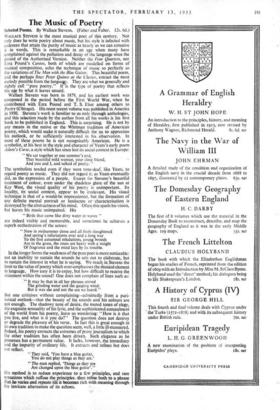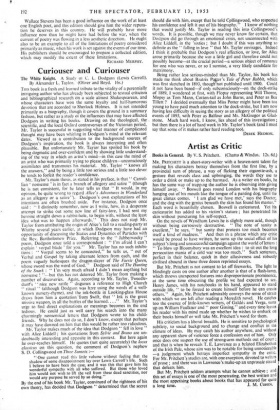The Music of Poetry
Selected Poems. By Wallace Stevens. (Faber and Faber. 12s. 6d.) WALLACE STEVENS is the most musical poet of this century. Not only does he write poetry about music, but his style is infected with cadences that attain the purity of music as -nearly as we can conceive it in words. This is remarkable in an age when many have complained against the pollution and decay of the language since the period of the Authorised Version. Neither the Four Quartets, nor Ezra Pound's Cantos, both Of which are modelled on forms of musical composition, echo the technique of music so perfectly as the variations of The Man with the Blue Guitar. This beautiful poem, and the perhaps finer Peter Quince at the Clavier, extract the most melody possible from the lang.uagr. They are what we generally and rightly call "pure poetry.' It the type of poetry that reflects the age by what it leaves unsaid.
Wallace Stevens was born in 1879, and his earliest work was composed in the period before the First World War, when he contributed with Ezra Pciund and T. S. Eliot among others to Poetry (Chicago). His most recent volume was published in America in 1950. Steven's. work is familiar to us only through anthologies, and this selection made by the author from all his works is his first book to be published in England. This is surprising. He is not by any means in the native or the _Whitman tradition of American poetry, which would make it naturally difficult for us to appreciate his outlook, or be sufficiently interested in his observation. In most of these poems he is not recognisably American. He is a symbolist, at his best in the style and character of Yeats's early poem Adam's Curse, a style which has since lost its social context in Europe: " We sat together at one summer's end,
That beautiful mild woman, your close friend, And you and 1, and talked of poetry."
The symbolists tended even if they were tone-deaf, like Yeats, to regard poetry as music. They did not regard it. as Yeats eventually did, as the expression of a people. Except for Stevens's beautiful treatment of colour, even under the shadeless glare of the sun at Key West, the visual quality of his poetry is unimportant. Its locality, its social context, appear to be irrelevant. His visual technique is that of a would-be impressionist, but the formation of any definite mental portrait or landscape or' characterisation is destroyed by the abstractness of his mind. Often this spoils his vision, but leaves his music unimpaired. His " Birds that came like dirty water in waves " are indeed visible and memorable, and sometimes he achieves a superb orchestration of the senses: " Now in midsummer come and all fools slaughtered And spring's infuriations over and a long way To the first autumnal inhalations, young broods Are in the grass, the roses are heavy with a weight Of fragrance and the mind lays by its trouble.
In the longer forms the weakness of the pure poet is more noticeable: not an inability to sustain the sounds he sets out to elaborate, but to sustain the interest in what he is saying. We reach in Stevens the limit to the value of poetry which over-emphasises the musical element in language. How easy it is to enjoy, but how difficult to receive the statement within the sound! One does not complain of lines such as: -1' It may be that in all her phrases stirred The grinding water and the gasping wind; But it was she and not the sea we heard."
But one criticises without complaining—admittedly from a puri- tanical outlook—that the beauty of his sounds and his colours are not enough. The shadowy note of desire, the muted tones of elegy, the exquisite sensuality of his lyric, and the sophisticated concealment of the world from his poetry, leave us wondering: "How is it that you live, and what is it you do?" The question does not destroy or degrade the pleasure of his verse. In fact this is great enough in its own tradition to make the question seem, well, a little ill-mannered. Indeed, his poetry corrects the extremes of prosy journalism to which the other tradition has often been driven. Such elegance as he possesses has a permanent value. It lacks, however, the immediacy and the impurity of ordinary life. It extracts and refines but does not reflect.
" They said, `You have a blue guitar, You do not play things as they are.'
The man replied, `Things as they are Are changed upon the blue guitar'."
His method is to reduce experience to a feir principles,--and rare sensations which suffuse the principles. then refine both to aphrase that he varies and repeats till it becomes rich with through.: the intricate alternation of its echoes. Wallace Stevens has been a good influence on the work of at least one English poet, and this edition should give him the wider reputa- tion he deserves in this country. He will probably have more influence now than he might have had before the war, when the current of poetry was flowing in a less aesthetic direction. He ought also to be an example to all of the limitations of poetry considered primarily as music, when his work is set against the events of our time. His publishers should be encouraged to prepare a collected edition, which may modify the extent of these limitations.
RICHARD MURPHY.



































 Previous page
Previous page